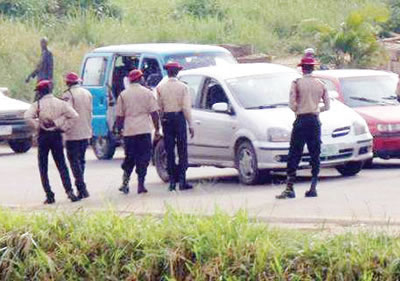The Federal Road Safety Corps (FRSC) is the best part of driving in Nigeria because they make you feel like you have a little action in your life. Some laws don’t even exist in the minds of the people, because they are not enforced hence why one can say those laws are a myth. The enforcement of the traffic laws lies in the hands of the FRSC, however, you can’t know what to expect from these officers, given latest FRSC news, possibly FRSC recruitment and even FRSC salaries if you do not know who they are and their duty to you the citizen and the country they serve.
The Federal Road Safety Corps is the Government Agency with the sole responsibility of road safety administration in Nigeria. In February 1988, the Federal Government founded the Federal Road Safety Commission, now Federal Road Safety Corps, through Decree No. 45 of 1988 as amended by Decree 35 of 1992 referred to in the statute books as the FRSC Act cap 141 Laws of the Federation of Nigeria (LFN). It was passed by the National Assembly as Federal Road Safety Commission (establishment) Act 2007. The FRSC operates in all parts of the country including the Federal Capital Territory (FCT) and is the lead agency on road safety administration and management in Nigeria. Every governing body has primary functions. The primary functions of FRSC include making the highway safe for motorists and other road user as well as ensuring roadworthiness of vehicles, Recommending works and devices to eliminate or minimize accidents on the highways and advising the Federal and State Governments including the Federal Capital Territory Administration and relevant governmental agencies on the areas where such works and devices are required and educating motorists and members of the public on the importance of discipline on the highways. This is what ought to happen.

In more detail the FRSC’s duties a greater. Each duty they must uphold, in a proper state, each officer should be devoted to serving his country the way the law states. Bearing in mind that Nigeria is a country where its officers and citizens may not even know the law, this can serve as a reminder to both parties on what to expect from and as an FRSC member, as given by the FRSC portal.
- Preventing or minimizing accidents on the highway: It is the duty of the FRSC to try, by all means, to prevent or minimize accidents. Also, they should develop models that can improve their techniques as to doing so.
- Clearing obstructions on any part of the highways.
- Educating drivers, motorists and other members of the public generally on the proper use of the highways: Education they say is key. One cannot be educated without the knowledge and the absence of knowledge is the state of ignorance. Before educating others the FRSC themselves must be educated to impart knowledge to the people. Knowledge shared will make the roads safer to ply.
- Designing and producing the driver’s license to be used by various categories of vehicle operators: The FRSC oversees designing and producing the driver’s license. It is illegal to drive in Nigeria without a driver’s license. Though people do it, it is wrong.
- Determining, from time to time, the requirements to be satisfied by an applicant for a driver’s license: In order to best serve the nation and maintain discipline the FRSC ought to determine necessary requirements to obtain a driver’s license, change can make things better.
- Designing and producing vehicle number plates: The FRSC is the government agency that produces your vehicle number plates/ license plates. Those who own and have registered cars are aware of this. For the young dreamer, this is information for you.
- The standardization of highway traffic codes.
- Giving prompt attention and care to victims of accidents: The FRSC is the first authority on the road that ought to provide prompt response and care to victims of accidents. Though the goal of the FRSC is to minimize accidents, accidents still happen, and this is their duty to victims.
- Conducting researches into causes of motor accidents and methods of preventing them and putting to use the result of such research.
- Determining and enforcing speed limits for all categories of roads and vehicles and controlling the use of speed limiting devices: Over speeding is one of the top causes of accidents, not just in Nigeria but around the world. Hence, speed limits are there to caution drivers and maintain a level of control of the road.
- Cooperating with bodies or agencies or groups in road safety activities or in the prevention of accidents on the highways: No man is an island, the FRSC must collaborate with other agencies to increase the impact of their work on the road.
- Making regulations in pursuance of any of the functions assigned to the Corps by or under this Act.
- Regulating the use of sirens, flashers and beacon lights on vehicles other than ambulances and vehicles belonging to the Armed Forces, Nigeria Police, Fire Service and other Para-military agencies.
- Providing roadside and mobile clinics for the treatment of accident victims free of charge: Roadside clinics are free of charge. If you or someone you know has ever been charged, the odds are you were scammed.
- Regulating the use of mobile phones by motorists: Mobile phones are not to be used when you’re on the road. This goes for the driver and the trekker. They are distracting and can cause accidents. Nigerians are fond of plugging their ears with earphones and making calls, or snapchatting while driving, it is wrong as you are not just endangering your life but the lives of others too.

- Regulating the use of seat belts and other safety devices: In Nigeria, it is compulsory for those sitting in front to wear a seatbelt. The FRSC must ensure that said passengers are properly using them and other safety devices.
- Regulating the use of motorcycles on the highway: Motorcyclist popularly called Okada men, feel they are above the law and can never be in traffic, therefore, they ride in cracks and between corners of traffic, without protective gear. The FRSC’s duty is to enforce the laws guiding then and regulate the use of motorcycles.
- Maintaining the validity period for drivers’ licenses which shall be three years subject to renewal at the expiration of the validity period.
- In exercise of the functions, members of the Commission shall have the power to arrest and prosecute persons reasonably suspected of having committed any traffic offense.
How would you know if you’ve committed a traffic offense? Keep reading.





